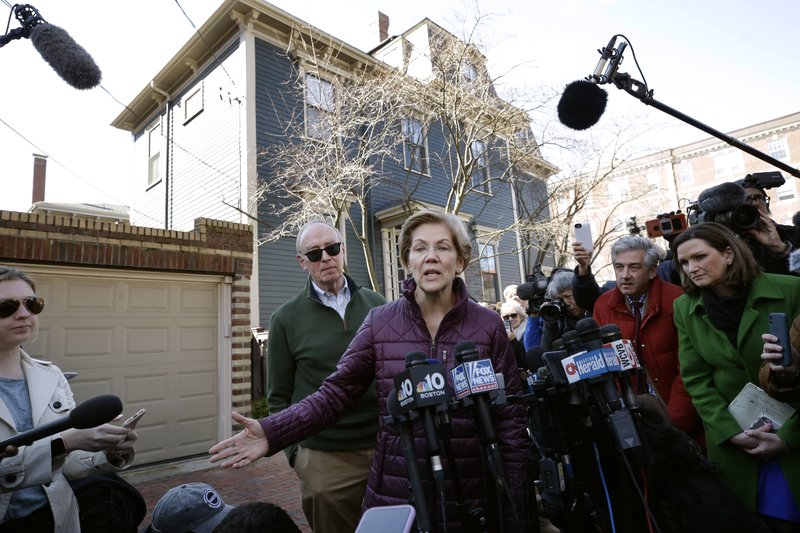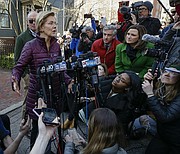WASHINGTON -- Sen. Elizabeth Warren dropped out of the Democratic presidential race on Thursday, days after she failed to win a single Super Tuesday state, not even her own.
For much of the past year, her campaign had robust poll numbers, fundraising and staff members on the ground across the country. But once voting began in February, she never found a base of supporters as Democrats coalesced around Vermont Sen. Bernie Sanders and former Vice President Joe Biden.
"I refuse to let disappointment blind me -- or you -- to what we've accomplished," Warren told her campaign staff on a call Thursday. "We didn't reach our goal, but what we have done together -- what you have done -- has made a lasting difference. It's not the scale of the difference we wanted to make, but it matters."
Outside her Cambridge, Mass., home Thursday, Warren said she wasn't going to endorse anyone right away.
[Video not showing up above? Click here to watch » https://www.youtube.com/watch?v=e8xv2TNlpdc]
"I need some space and I need a little time right now," she said, standing next to her husband, Bruce Mann, and golden retriever, Bailey.
Warren's voice cracked when she talked about meeting so many little girls while campaigning around the country for the past year and knowing they "are going to have to wait four more years," at least, to see a woman in the White House.
"One of the hardest parts of this is all those pinkie promises," a visibly emotional Warren said, describing the "trap" of gender for female candidates.
"If you say, 'Yeah, there was sexism in this race,' everyone says, 'Whiner!'" Warren said. "If you say, 'No, there was no sexism,' about a bazillion women think, 'What planet do you live on?'"
Warren's exit leaves the Democratic field with just one female candidate, U.S. Rep. Tulsi Gabbard of Hawaii, who has collected only one delegate toward the nomination.
She leaves a Democratic field that began as the most diverse in American history.
Warren said that from the start, she had been told there were only two true lanes in the 2020 contest: a liberal one dominated by Sanders, 78, and a moderate one led by Biden, 77.
"I thought that wasn't right," Warren said as she suspended her campaign, "But evidently I was wrong."
DISAPPOINTING FINISHES
Before her exit, Warren accumulated the second-largest number of Democratic delegates of any woman to run for president in history, behind only Hillary Clinton, the 2016 nominee.
She invested heavily in the early states, with a ground game that was the envy of her rivals. But it did not pay off: In Iowa, where she had bet much of her candidacy -- she had to take out a $3 million line of credit before the caucuses to ensure she could pay her bills in late January -- she wound up in a disappointing third place.
Warren slid to fourth in New Hampshire and Nevada, and to fifth in South Carolina. By Super Tuesday, her campaign was effectively over -- with the final blow losing her home state, Massachusetts.
Despite Warren's disappointing finish, she offers the potential of a coveted endorsement to Sanders and Biden, who are effectively the last candidates in the Democratic contest.
In an interview after Warren's departure was announced, Toni Van Pelt, the president of the National Organization for Women, urged her not to back Sanders.
"She has a lot of leverage right now. We do trust her to make the right decisions on how to proceed. But we'd like her not to rush into this," Van Pelt said. "We think that our constituents, our members, will not necessarily think of Sanders as the best choice. We wouldn't have the Violence Against Women Act if it wasn't for Biden's leadership. So, we know that he's performed. Sanders doesn't have a record. He's really, as far as we know, done next to nothing for women and for our issues and for the things that are our priorities."
Last summer, Warren drew tens of thousands of supporters to Manhattan's Washington Square Park, a scene that was repeated in places like Washington state and Minnesota.
She was calling for "structural change" to the American political system to reorder the nation's economy in the name of fairness. She had a signature populist proposal for a 2% wealth tax she wanted to impose on households worth more than $50 million that prompted chants of "Two cents! Two cents!" at rallies across the country.
Warren hit her stride as she hammered the idea that more moderate Democratic candidates, including Biden, weren't ambitious enough to roll back President Donald Trump's policies and were too reliant on political consultants and fickle polling. And she drew strength in the #MeToo era, especially after a wave of female candidates helped Democrats take control of the U.S. House in 2018.
But there was also tumult, notably after she released a DNA test in response to goading by Trump to prove she had American Indian ancestry. Instead of quieting critics who had questioned her claims, however, the test offended many tribal leaders who rejected undergoing the genetic test as culturally insensitive, and it didn't stop Trump and other Republicans from deriding her as "Pocahontas."
Warren got a foil for all of her opposition to powerful billionaires when former New York Mayor Mike Bloomberg entered the race. During a debate in Las Vegas just before Nevada's caucus, Warren hammered Bloomberg, and the ex-mayor's lackluster response touched off events that ended with him leaving the race on Wednesday.
For Warren, that led to a rise in fundraising but didn't translate to electoral success.
By South Carolina, an outside political group began pouring more than $11 million into TV advertising on Warren's behalf, forcing her to say that, although she rejected super PACs, she'd accept their help as long as other candidates did. Her campaign shifted strategy again, saying it was betting on a contested convention.
BLOOMBERG'S PLANS
Meanwhile, Bloomberg says he will form a new independent expenditure campaign that will absorb hundreds of his presidential campaign staff members in six swing states to work to elect the Democratic nominee this fall.
The new group, with a name that is still undisclosed because its trademark application is pending, also would be a vehicle for Bloomberg to spend money on advertising to attack Trump and support the Democratic nominee, according to a person familiar with the discussions, who spoke on the condition of anonymity to discuss internal deliberations.
Bloomberg has continued to taunt Trump on social media, tweeting a new video Thursday that cut together a number of clips in a way meant to mock Trump's claims that he would win the White House, hold the Senate and take back the U.S. House.
"We are not going anywhere. We will haunt your dreams. We are in your head," the video declares by splicing together clips from movies, television shows and music videos. "Starting today, and every day after that, every morning, every night, we will be here watching you, always watching, making sure everyone one knows what a disaster you are."
The new group, operating with the same gigantic bankroll that funded Bloomberg's campaign, could play a major role in shaping the general election this fall. Bloomberg, who is worth more than $50 billion, has not ruled out using the group to spend money to support Biden during his primary fight against Sanders.
The promise of help has been welcomed by Biden, but advisers to Sanders have said they do not want any general election assistance from Bloomberg if the senator wins the nomination.
Bloomberg's advisers have identified Wisconsin, Michigan, Pennsylvania, Arizona, Florida and North Carolina as the six states that could swing this year. Staff members in each of those states have signed contracts through November to work on the effort.
The Bloomberg campaign offices and employees that remain in other states -- he has 12 offices open in Ohio, for example -- will close in the coming weeks. Staff members will be offered the chance to apply for field work in the targeted general-election states.
Because of campaign-finance rules, Bloomberg's aides have concluded that they cannot simply tell campaign employees to work directly for Biden. "The folks in those states have been told that they can apply for spots in the battleground," said the person familiar with the plans.
At its peak, Bloomberg's campaign said it had more than 2,100 staff members, including about 1,800 in states.
Information for this article was contributed by Will Weissert of The Associated Press; by Astead W. Herndon and Shane Goldmacher of The New York Times; and by Michael Scherer of The Washington Post.
A Section on 03/06/2020

